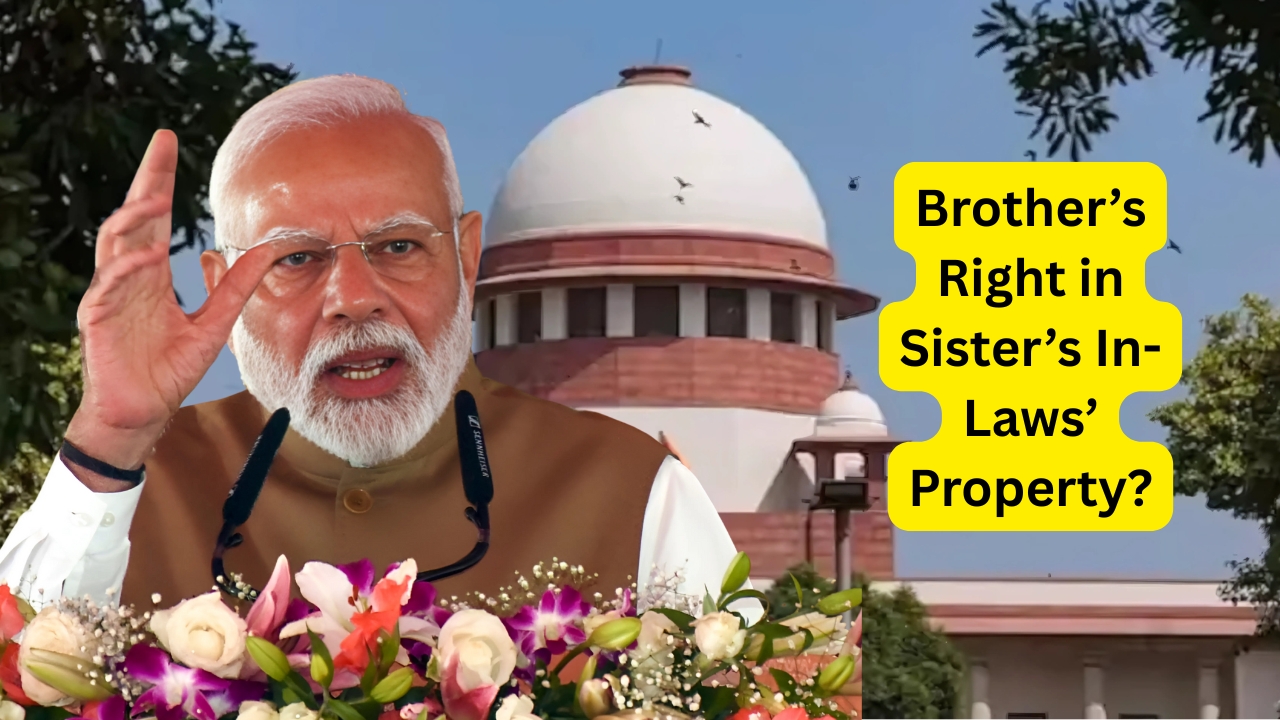Familial property rights A brother has no right in in-laws’ property In a significant judgement that clarifies familial property rights, the Supreme Court has categorically said that a brother has no legal right over property belonging to the in-laws of his sister.
The ruling by a two-judge bench resolves a thorny issue that has vexed countless Indian families and choked the legal system with squabbles over inheritances for years.
Table of Contents
Background of the Case

The case originated from a property dispute in Rajasthan where Mahendra Singh claimed partial ownership of a house purchased by his sister Kavita’s father-in-law.
Singh’s argument hinged on the premise that as his sister’s brother, he maintained certain rights over property that came into her marital family, especially in circumstances where she had no children of her own.
The sister’s in-laws contested this claim vehemently, maintaining that ancestral property rights follow strict legal guidelines that do not extend lateral family connections across marriage boundaries.
The case wound its way through district courts and high courts over a period of eight years before reaching the apex court.
“This case represents a fundamental misunderstanding of property law in India,” stated Justice Priya Sharma, who authored the majority opinion.
“Family connections, however strong emotionally, do not automatically translate to property rights across marital boundaries unless specifically documented in legal instruments.”
The Court’s Reasoning
The 87-page judgment of the Supreme Court is a detailed exploration of the history of property rights in Indian family law and includes a comparison of differing personal laws as well as the commonality of the principle that marriage creates a new legal unit with proprietary consequences.
In the judgment delivered by Justice Sharma, with Justice Ahmed Patel concurring, the following salient point was made;
“In Indian law, marriage alone, irrespective of the personal law applicable, creates boundaries of property rights.
Simultaneously, she also carries certain rights in her father’s property even after marriage; however, this linkage is not reciprocal and does not create any entitlement of the natal family members over the property of the marital family.
The court added, “Property of in-laws is exclusively within their control and there is neither any right nor an expectancy of the appellant to succeed to that property in testamentary or intestate succession relating to in-laws.
There is no automatic interest of a brother in the above property unless specified as a beneficiary in a will or legal document.
“To honor such a claim would create an intolerable expansion of property rights causing havoc to wills,” the decision said.
The result would be a near infinite pool of potential claimants to any family’s property, making estate planning nigh impossible.
Implications for the Law of Property
Legal analysts said this ruling cleared up one of the most complex and indecisive areas of the law which severely blurs a line between family members and property claims.
The judgement is likely to have a bearing on thousands of cases pending in the courts throughout India based on similar grounds.
Senior advocate Rajiv Mehta, who practises property law, gave a broader view: “This judgment clearly puts a stop to a suspicion gap that some tried to take advantage of.
It supports the principle of testamentary freedom and recognises that marital families are separate legal entities for the purpose of property.”
The Court also mentioned potential hard cases, observing that real instances of dependency should be addressed through appropriate legal mechanisms like maintenance laws or specific bequests in wills, and not «through strained readings of property rights.
“Nothing in this opinion prevents families from voluntarily retaining extended family members in their testamentary plans,” Justice Patel wrote in a concurring opinion.
“But it’s the best way to make sure such inclusions are optional, not required.
Legal Community Response
The judgment has been widely praised among the legal community for its clarity, and its holistic treatment of a complex case.
The Bar Council of India, lauding the ruling as a ‘landmark judgment’, declared that “this judgment will act as a clear precedent which will curtail the endemic litigation in family property.”
But some champions of extended family rights have sounded alarm bells. Family Rights Association chairperson Lakshmi Narayan said, “We respect the Court’s judgment but there are exceptional cases wherein brothers are looking after their sisters all their life and maintain close association with in-laws’ families. Total exclusion may seem harsh in such situations.”
The Court, however, predicted these concerns, stating in its decision: “Extraordinary cases of contribution or dependency should be covered by specific legal regimes appropriate to those ends, not through misuse of the principles of civil law.”
Social Consequence and Cultural Context
The ruling addresses long-held cultural norms in many Indian societies that family relations tend to go beyond legal confines.
In becoming guardians of their sisters even after they leave their natal homes as a result of marriage, brothers are expected to provide assistance, responsibilities that may spill over into property issues in some customary settings.
Sociologist Dr Ananya Gupta of Delhi University said: “The legal has intersected with the new emerging social.
With increasing prevalence of nuclear families and greater legal knowledge, such judgments play a role in realigning the expectations to the legal position.”
The Court recognized these contextual aspects but insisted that, in spite of regional or local variations of the practice, law must be clear and lay down specific guidelines.
“Custom may influence the law, but cannot supplant the basic rules of law, particularly in the cases of importance of property rights,” the decision said.
Implementation Challenges
Even though the directive is straightforward, experts predict that enforcement could be an issue – especially in rural regions where elders frequently elevate customary methods over the official legal system.
The judgment calls for legal consciousness programmes for public education as to the limits of familial property rights.
Anand Sharma, Director of the Rural Legal Aid Society, emphasized the possible challenges: “Property disputes are resolved in a large number of villages by panchayats and family elders and not the courts.
“And as with all court judgments, there will need to be a concerted effort to ensure this judgment filters down to the poorer citizens who use grass roots dispute resolution mechanisms.
The Court requested state legal services authorities to sensitize people on this specific issue by holding awareness programmes which was expected to prevent litigation more effectively than the remedial action of punishing offenders.
Special Cases and Exceptions
In laying down the general principle, the judgment noted its exceptions in which other considerations may have a bearing.
Cases where brother and sisters inherit ancestral properties together, and then one of the sisters is married in a family who’s having joint holding property.
Cases in which a written agreement, which specifically confers rights upon stepbrothers or stepsisters
Properties Purchased Jointly, With Help From Extended Family Members
“These exceptions need to be established by documentary evidence and cannot be inferred from mere family relations,” the judgment explained.
“In asserting such exceptions the burden of proof is heavily upon the one asserting the rights outside the regular legal system.
The decision of the Supreme Court is a notable turning point in the development of Indian law on the family property.
Create a hard division of families for the purposes of property, and it gives us a clear line that would help stop a hundred disputes.
Justice Sharma ended the decision quoting the broader importance.”Family ties are delicate and need dialogue such that emotionally and on the social front there is hygiene and purity in every system,”.Justice Sharma concluded the order.
But property rights need to be clear and predictable to work. This judgment is intended to promote family ties by eliminating ambiguity that can lead to bitter contention.”
A Nudge For Families To Tackle Long-Term Care Planning For long-term care planning, the courts have had a cracks-the-whip attitude, ruling that spending down assets in anticipation of applying for Medicaid isn’t a hardship.
It could also lead to further take-up of written wills among groups which have historically relied on custom-based succession.
The judgement will serve as a torchbearer even as Indian society continues to grapple with the intricacies of traditional family systems and modern-day legalities which would accord honour to relationships while drawing the line wherever boundaries need to be set.
So the question which has divided families and courts alike – whether a brother no matter how close to a sister has no legally enforceable right over the property of his sister’s in laws – has been put to rest by the Supreme Court.
This right is not possible except as the result of an explicit legal device expressly conferring such rights.





